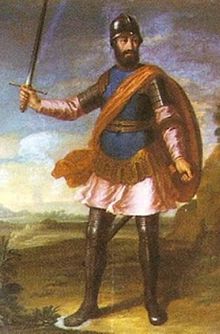Fernando I, Duke of Braganza
| Fernando I | |
|---|---|

D. Fernando I; Ducal Palace of Vila Viçosa
|
|
| Duke of Braganza | |
| Tenure | 15 December 1461 – 1 April 1478 |
| Predecessor | Afonso I |
| Successor | Fernando II |
| Born | 1403 Kingdom of Portugal |
| Died | 1 April 1478 Vila Viçosa, Alentejo, Kingdom of Portugal |
| Spouse | Joana de Castro |
| Issue among others... |
Fernando II João, 1st Marquis of Montemore-o-Novo Álvaro, 4th Lord of Cadaval |
| House | Braganza |
| Father | Afonso, Duke of Braganza |
| Mother | Beatriz Pereira de Alvim |
| Religion | Roman Catholicism |
Dom Fernando I of Braganza (Portuguese pronunciation: [fɨɾˈnɐ̃du]; 1403 – 1 April 1478) was the 2nd Duke of Braganza and the 1st Marquis of Vila Viçosa, among other titles. He took part in the Portuguese conquests in North Africa and served as governor of different territories there.
Born in 1403, Fernando was the son of Afonso, 1st Duke of Braganza and Beatriz Pereira de Alvim. He was given the title of 3rd Count of Arraiolos when still a child.
In 1432, the young Fernando was called upon by King John I for consultation on a project, promoted by Prince Henry the Navigator, to launch a campaign of conquest against the Marinid sultante of Morocco. Fernando advised against the project. When the project was raised again during the reign of King Edward in 1436, Fernando reiterated his objections. Nonetheless, despite his opposition, Edward appointed Fernando as constable of the nobles for the 1437 expedition to seize Tangier. Although the expedition was under the overall command of Henry the Navigator, Edward felt Fernando's military expertise was necessary to make up for Henry's inexperience.
After failing to conquer the city by assault, the Portuguese expeditionary army was surrounded and starved into submission by a Moroccan relief army. In return for being allowed to withdraw his troops unmolested, Henry agreed to a treaty to deliver Ceuta back to the Marinids. For the fulfillment of the treaty, Henry handed over his own brother, Ferdinand the Saint Prince as a hostage to the Moroccans.
Back in Portugal, Fernando led the opposition to the treaty. At the Cortes of Leiria assembled in early 1438 by King Edward, Fernando rallied the nobles and took the floor, urging them to refuse to surrender Ceuta. Fernando claimed the treaty was signed under duress and invalid. It was largely because of Fernando's energetic campaign that the Cortes rejected ratification and told the king to find some other way of securing Prince Fernando's release (none was found – Fernando the Saint Prince would die in Moroccan captivity in 1443).
...
Wikipedia
